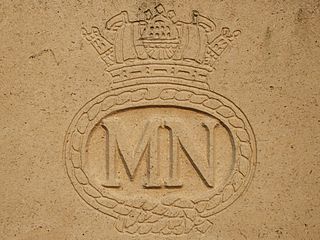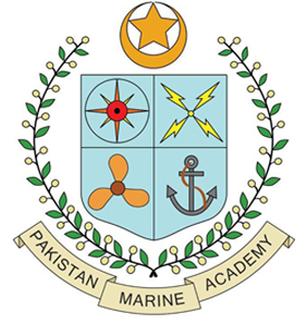
The British Merchant Navy is the collective name given to British civilian ships and their associated crews, including officers and ratings. In the UK, it is simply referred to as the Merchant Navy or MN. Merchant Navy vessels fly the Red Ensign and the ships and crew are regulated by the Maritime and Coastguard Agency (MCA), a specialist agency of the UK Department of Transport. British merchant ships are registered under the UK or Red Ensign group ship registries. British Merchant Navy deck officers and ratings are certificated and trained according to STCW Convention and the syllabus of the Merchant Navy Training Board in maritime colleges and other training institutes around the UK.
The Canadian Coast Guard College (CCGC) is a maritime training college and Canadian Coast Guard facility located in Westmount, Nova Scotia—a suburb of the former city of Sydney in the Cape Breton Regional Municipality.

Cochin University of Science and Technology (CUSAT) is a state government-owned autonomous university in Kochi, Kerala, India. It was founded in 1971 and has three campuses: two in Kochi and one in Kuttanad, Alappuzha, 66 km (41 mi) inland.

The National Maritime College of Ireland is a public maritime college located in Ringaskiddy, County Cork, Ireland. It is a constituent college of the Munster Technological University. Founded in 2004, it is situated on former Department of Defence land aside the Haulbowline naval base, the headquarters of the Irish Naval Service. It is the first dedicated maritime college of its kind in the State, and was built under the Irish Government's Public-Private Partnership scheme, involving the Munster Technological University, the Naval Service and a number of other partners.

Pakistan Marine Academy (PMA) is located at Karachi, Sindh, Pakistan. It is a Seafarers Training Academy, working under Federal Ministry of Maritime Affairs, Government of Pakistan as an autonomous department. It is affiliated with NED University of Engineering and Technology and is also recognised by Higher Education Commission, Pakistan. Pakistan Marine academy covers an area of around 136 acres on the water front in Karachi Harbor, Hawksbay Road.

The Indian Maritime University - Kolkata Campus (formerly known as the Marine Engineering and Research Institute (MERI) and the Directorate of Marine Engineering Training (DMET)) is a post-secondary institution in India specialising in marine engineering.

The Indian Maritime University (IMU), Navi Mumbai Campus, formerly known as Training Ship Chanakya , is a prestigious institution dedicated to maritime education and training. It serves as a prominent unit of the Mumbai campus of Indian Maritime University. Established to address the growing need for maritime professionals, the institution offers a range of training programs, with its flagship being the three-year B.Sc. degree program.

Wayamba University of Sri Lanka is the thirteenth national university in Sri Lanka. It was established as the Affiliated University College of North Western Province in 1991 and after it was become the Rajarata University of Sri Lanka "Wayamba mandapa" in 1996.It was a full flagged university naming as Wayamba University of Sri Lanka in 1999. The main purpose of the university is offering English-medium degree, diploma and certificate courses in areas such as Agriculture, Applied Science, Management and Technology for students and working professionals. The courses are highly up-to-date and job-oriented.

The West Bengal University of Animal and Fishery Sciences (WBUAFS) is a public state veterinary university in West Bengal, India. It was established on 2 January 1995 by an Act of the West Bengal legislature. It imparts education and training in veterinary and animal sciences, dairy sciences, and fishery sciences.

Tokyo University of Marine Science and Technology, abbreviated as Kaiyodai, is a national university in Japan. The main campus is located in Minato, Tokyo and another campus is in Kōtō, Tokyo.
Warsash Maritime School, formerly Warsash Maritime Centre and Warsash Maritime Academy, is a maritime training college that is part of Solent University. The college provides education, training, consultancy and research to the international shipping and off-shore oil industries. It is one of the United Kingdom's colleges responsible for the training of the British Merchant Navy. The courses on offer cover a wide range of maritime education and training from deck and engineer officer cadetships, including degree pathways, to senior officer certificates of competency, together with the associated safety training.

A Yachtmaster qualification is a certificate of competence of the ability to handle either a sailing boat or motor boat in certain prescribed conditions. Three different titles are specified; Yachtmaster Coastal, Yachtmaster Offshore, and Yachtmaster Ocean which specify the level of competence required and the area of operation certified.

Marine Fisheries Academy (MFA) known as Bangladesh Marine Fisheries Academy (BMFA) is a government-run training institution in Bangladesh for cadets wishing to enter the fishing industry, merchant shipping and other related maritime industries. Established in 1973, it is the only national organization offering training for these professions.

Myanmar Maritime University (MMU) (Burmese: မြန်မာနိုင်ငံ ရေကြောင်းပညာ တက္ကသိုလ် ), located in Thanlyin in the outskirts of Yangon, is the premier university of maritime education in Myanmar. MMU offers 5-year bachelor's degree programs. Starting from 2012, MMU, administered by the Ministry of Transportation, offers two-year post-graduate diplomas in various marine and naval disciplines. In 2007, the school had about 1,800 graduate students, pursuing international STCW-95-standards compliant maritime education.

The Indian Maritime University, abbreviated as IMU, is a public central university directly under the Ministry of Ports, Shipping and Waterways, in India. It deals with a wide range of topics related to the sea, ranging from oceanography to maritime law and history, and including practical topics such as search and rescue at sea and the transportation of dangerous goods. It is India's prestigious national institute for the training of Merchant navy Officers. Admissions to IMU are done through IMUCET entrance examination, which is conducted every year across the country. It was established by the Indian Maritime University Act 2008, on 14 November 2008.Before the foundation of IMU, there were seven renowned teaching and research institutes under the Ministry of Shipping. The following legacy institutes were subsumed under IMU in 2008.

The Federal College of Fisheries and Marine Technology is a higher education institute located on Victoria Island in Lagos, Nigeria. It is a monotechnic approved by the National Board for Technical Education. The College was originally known as the Federal School of Fisheries, established in 1969 as a vocational training institute for Nigeria's in-shore fishing fleet. It was upgraded to a technological institution in 1992. The college offers courses in fisheries technology, general science, marine engineering, nautical science and Maritime Transport and Business Management. It has two hostels, accommodating about 450 students.

PMI Colleges, formerly known as Philippine Maritime Institute, is a private, non-sectarian, co-educational higher education, Maritime institution established on September 18, 1948 in Santa Cruz, Manila, Philippines where its main campus is located.
The Fisheries College and Research Institute (FCRI) is situated in Thoothukudi, Tamil Nadu, India.
The Bachelor of Fisheries Science (B.F.Sc) is a bachelor's degree for studies in fisheries science in India. "Fisheries science" is the academic discipline of managing and understanding fisheries. It is a multidisciplinary science, which draws on the disciplines of aquaculture including breeding, genetics, biotechnology, nutrition, farming, diagnosis of diseases in fishes, other aquatic resources, medical treatment of aquatic animals; fish processing including curing, canning, freezing, value addition, byproducts and waste utilization, quality assurance and certification, fisheries microbiology, fisheries biochemistry; fisheries resource management including biology, anatomy, taxonomy, physiology, population dynamics; fisheries environment including oceanography, limnology, ecology, biodiversity, aquatic pollution; fishing technology including gear and craft engineering, navigation and seamanship, marine engines; fisheries economics and management and fisheries extension. Fisheries science is generally a 4-year course typically taught in a university setting, and can be the focus of an undergraduate, postgraduate or Ph.D. program. Bachelor level fisheries courses (B.F.Sc) were started by the state agricultural universities to make available the much needed technically competent personnel for teaching, research and development and transfer of technology in the field of fisheries science.
Ocean University of Sri Lanka was established in 2014 by an act passed by the Parliament of Sri Lanka. It was earlier called the National Institute of Fisheries and Nautical Engineering. The objective of the university is to conduct academic and professional education and vocational training activities in fisheries, marine and nautical engineering to fulfill and develop the needs of the fisheries and allied sector in Sri Lanka.















